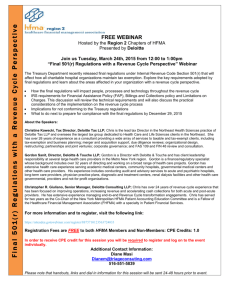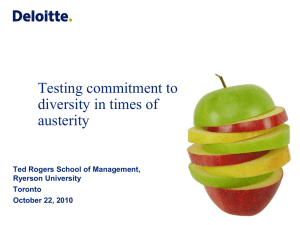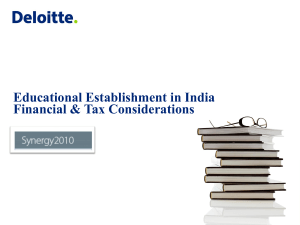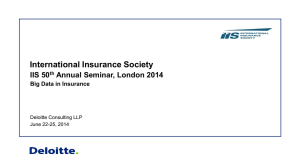Valerie Chort
advertisement
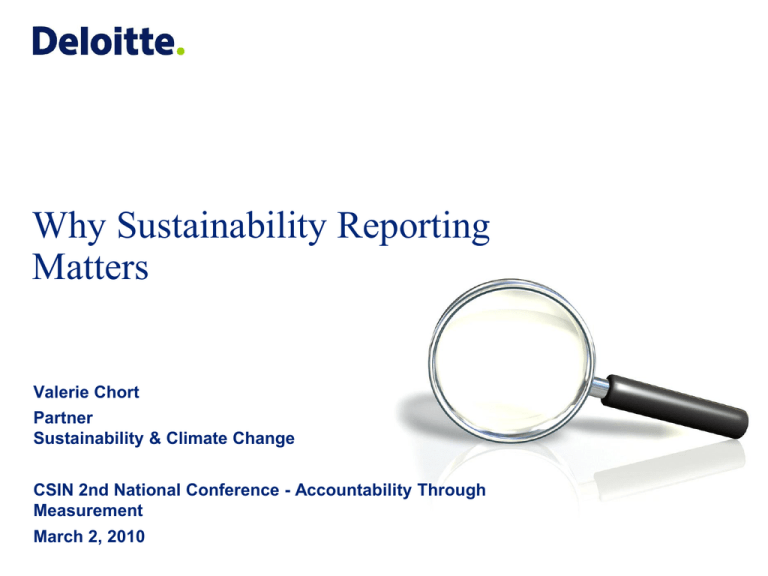
Why Sustainability Reporting Matters Valerie Chort Partner Sustainability & Climate Change CSIN 2nd National Conference - Accountability Through Measurement March 2, 2010 Drivers of change Drivers of change Politicians & regulators Customers Investors & creditors Rating agencies Employees Communities NGOs, SIGs, etc. Opportunities and threats Business operations Changing laws and regulations Impact on competitiveness Strategy, risk management and governance 1 1 1 IISD Conference Conference Ogilvy Renault – April 16, 2009 Deloitte CR&S Presentation – August 25, 2009 IISD © Deloitte & Touche LLP and affiliated entities. Disclosure demands are increasing • Carbon Disclosure Project : Climate Change Disclosure – Annual survey request on behalf of 475 international institutional investors with $55 trillion in assets under management – Sent out to more than 3,700 companies worldwide • Indices focused on environmental, social and economic performance – DJSI (Dow Jones Sustainability Index) (World) – FTSE4Good (World) – Jantzi Social Index (Canada) – Domini Social Equity – Ethibel Sustainability Index • Principles for Responsible Investment (PRI) – 75% of asset owners that are signatories to PRI disclose how Corporate Responsibility (CR) issues are integrated into their investment practices (2009). 2 IISD Conference © Deloitte and Touche LLP and affiliated entities. Disclosure demands are increasing (cont’d) • 380 shareholder proposals in North America in 2009, half were related to sustainability and governance topics Source: Shareholder proposals were found in a database compiled by Interfaith Center for Corporate Responsibility. http://www.iccr.org/ethvest.php Source: Ethical Funds Sustainable Investing Program 2008 Annual Report 3 IISD Conference © Deloitte & Touche LLP and affiliated entities. OSC & SEC clarify disclosure expectations • OSC and SEC are clarifying expectations related to climate change disclosure – Dec. 2009, OSC issued Notice 51-717 Corporate Governance and Environmental Disclosure which communicates their plans to enhance compliance by reporting issuers with corporate governance and environmental disclosure requirements. – OSC will conduct a compliance review of corporate governance disclosure filed by issuers in spring 2010 and will develop guidance for issuers on compliance with existing environmental disclosure requirements, as set out in National Instrument 51-102 Continuous Disclosure Obligations. – The OSC intends to publish guidance by December 2010 to give reporting issuers sufficient time to consider it when preparing their 2010 annual continuous disclosure documents. 4 IISD Conference © Deloitte & Touche LLP and affiliated entities. SEC interpretive release on climate change disclosure • Addresses four topics related to climate change matters that registrants should consider when assessing what information to provide in their filings under existing SEC disclosure requirements. 1. Impact of existing and potential litigation or regulation. • specific risks as a result of climate-change legislation or regulation • “reasonably likely to be enacted” and “reasonably likely to have a material effect” • positive as well as negative consequences 2. Effect of international accords and treaties related to climate change, specifically those associated with governing greenhouse gas emissions. 3. Actual and potential indirect consequences of climate-changerelated regulations or business trends (e.g., reduced demand for ghg producing products, higher demand for products with lower emissions than competitor products). 4. Actual / potential impacts of the physical effects of climate change. 5 IISD Conference © Deloitte & Touche LLP and affiliated entities. Quality Reporting 6 IISD Conference © Deloitte & Touche LLP and affiliated entities. Sustainability Strategy Framework Environmental Footprint Employment Practices Product Stewardship • Energy sources • Recruiting and attracting talent • Energy efficiency • Training programs and career development • Disposal of products at end-of-life, takeback programs (e.g., smart phones, other electronic equipment) • Green buildings (retail and corporate) • Greenhouse gas management • Waste management and recycling • Water consumption • Hazardous / toxic materials • Green IT • Fleet management • Biodiversity Governance and Reporting • Diversity • Employee wellness / absenteeism • Occupational health and safety • Compliance / ethics and transparency • Stakeholder engagement • Privacy and data collection • Management systems to track key environmental and social performance indicators • Environmental and social reporting and communications • Third-party verification • Recycled materials content (metal, plastics, etc) • Workplace design / virtual • Responsible materials usage (e.g., elimination of PVC, BFRs) • Employee travel & commute • Environmental design Impact on Communities Enlightened organization • Board /management oversight • CR&S policies / accountability • Coltan policy • Brand / reputation management • Strategic philanthropy (e.g., priorities, programs, causes) • Employee volunteerism and giving Customer Partnerships • Marketing and promotion of sustainable products / practices • Customer information / awareness on products and their impacts • Contribution to business customers’ environmental policies and sustainability objectives • Dealer relations • Strategic alliances • Community health and education Sustainable / Ethical Sourcing • Ethical sourcing: supplier code of conduct (e.g., human rights, anti-child labor and fair workforce practices) • Environmentally-friendly purchasing policies • Supplier management: environment, health and safety performance, evaluation and compliance audit programs • Supplier diversity programs Source: Deloitte Analysis 7 IISD Conference © Deloitte & Touche LLP and affiliated entities. What makes a quality report? The Deloitte Sustainability Reporting Scorecard SUSTAINABILITY REPORT I. Communicate Effectively II. Identify Relevance Report Provider III. Demonstrate Commitment and Management Quality IV. Address the Sustainable Development Agenda Report User V. Quantify Performance VI. Achieve Credibility 8 IISD Conference © Deloitte & Touche LLP and affiliated entities. The Basis for a good Sustainability report • As key element or CR reporting, we focus on consistency, or “red thread” between the different layers of the report, so that – in the end – targets and indicators are relevant, value-adding and reflect the corporate context. Targets and indicators Sustainable value creation Targets and indicators Sustainable Value creation Management commitment and strategies Stakeholders and relevant issues Corporate Context Report with ”Red Thread” – consistency between it’s layers 9 IISD Conference Corporate Context Report with no ”Red Thread” – targets and indicators may be extensive, but do not reflect the layers below © Deloitte & Touche LLP and affiliated entities. Building a Leading Report The Deloitte Sustainability Reporting Scorecard Focuses on quality rather that quantity, and provides guidance on the process of reporting to make sure that the report is able to communicate effectively. Categories include: 10 IISD Conference © Deloitte & Touche LLP and affiliated entities. Reporting Trends 11 IISD Conference © Deloitte & Touche LLP and affiliated entities. Leading practices • Reports cross-referenced with XBRL (eXtensible Business Reporting Language) • Materiality Matrix: Stakeholder concern vs. Impact to business • CR governance diagrams • GRI reference tables with indicator information • Stakeholder review of report • Context-based reporting 12 IISD Conference © Deloitte & Touche LLP and affiliated entities. Context-based sustainability reporting An emerging advanced school of corporate sustainability management that measures, manages and reports sustainability performance relative to actual social, economic and environmental conditions in the world. Stakeholder Demands • Organizations, like Loblaw, are now assessing suppliers relative to sustainability standards of performance (context), not just top-line data or trends • Provides organizations with the appropriate information necessary to understand their environmental and social risks based on stakeholder norms and expectations Risk Mitigation • Reveals social, economic and environmental blind spots for management • Helps avoid claims of green-washing and opacity in reporting • Provides a competitive advantage relative to organizations whose reporting doesn’t include context Standards Branding 13 IISD Conference • The Global Reporting Initiative (GRI) requires context in sustainability reports • Strengthens stakeholder perceptions of organization’s sustainability performance © Deloitte & Touche LLP and affiliated entities. Example: context-based sustainability reporting – water use Performance Reporting With Context Missing Level of Water Use Performance Reporting With Context Included Level of Water Supply – Context, in the case of water, consists of available renewable supplies, mainly from precipitation. – Declining use ̶ or even increasing efficiency ̶ does not necessarily translate into sustainable performance; background conditions (i.e., supplies) must be considered as well. – In this example, performance was unsustainable in all three years, despite year-over-year decline in use. 14 IISD Conference © Deloitte & Touche LLP and affiliated entities. Best practices from the 2009 CICA Corporate Reporting Awards 15 IISD Conference © Deloitte & Touche LLP and affiliated entities. Observed weaknesses • Poor integration with corporate agenda • Omission of material issues raised elsewhere • Failure to address sector-specific issues 16 IISD Conference © Deloitte & Touche LLP and affiliated entities. What works: Attention to the clarity of communication • Clearly communicates information – Reader-friendly • Logical flow • Simple tools – Table of contents – Visual elements: tables, graphs, diagrams – Glossary • Contextualized information – Historical – Sector benchmarking – Indicators per business operations • Best practice: GRI summary table • Potash, TransAlta, BMO, Talisman, Suncor, Catalyst 17 IISD Conference © Deloitte & Touche LLP and affiliated entities. 18 IISD Conference © Deloitte & Touche LLP and affiliated entities. What works: Scope and integrity of data clearly defined • Boundaries: Reader needs to know what is covered • Best Practices: Discussion of scope of report – Operations – Sustainability elements (environmental, H&S, social, etc.) – Regions covered – Period under review – Quantities subject to external party verification • • • • • 19 Expanding scope over time Materiality Areas under control Areas influenced Bombardier, TransAlta, Catalyst, TELUS IISD Conference © Deloitte & Touche LLP and affiliated entities. 20 IISD Conference © Deloitte & Touche LLP and affiliated entities. Example: Organizational snapshot 21 IISD Conference © Deloitte & Touche LLP and affiliated entities. What works: Transparent and balanced disclosure • • • • • • Contextualized information Industry benchmarking Explanations for achievements and shortfalls Acknowledgement and discussion of challenges Tracking progress against previously-defined goals Establishing specific targets for upcoming year • Nexen, Suncor, Potash, TELUS 22 IISD Conference © Deloitte & Touche LLP and affiliated entities. 23 IISD Conference © Deloitte & Touche LLP and affiliated entities. What works: Formal external review process • Enhances credibility • Provides unbiased feedback on quality of disclosure • Helps to identify gaps in reporting • Drives data integrity • Best practice: Publication of unaltered stakeholder feedback • 3rd Party Assurance: Suncor, Nexen, Talisman, Telus, Barrick 24 IISD Conference © Deloitte & Touche LLP and affiliated entities. vbb 25 IISD Conference © Deloitte & Touche LLP and affiliated entities. What works: Effective web-based disclosure • Migration from printed material to web-based reports • Thoughtful information architecture • Accessible Sustainability information – Minimal mouse clicks – Hyper-linking – Tailored to stakeholder • Multiple reporting formats – PDF – HTML • Bombardier, TELUS, Catalyst, Potash, Suncor 26 IISD Conference © Deloitte & Touche LLP and affiliated entities. 27 IISD Conference © Deloitte & Touche LLP and affiliated entities. Closing thoughts 28 IISD Conference © Deloitte & Touche LLP and affiliated entities. Remember...sustainability performance is broader than reporting Sustainability performance requires careful planning and execution. Every step of the journey is critical to success, from early stages of sustainability strategy development to building trust and receiving recognition for sustainability reporting. Are we communicating well? Feedback Strategy & Execution Are we doing the right things? The Performance Journey Assurance Are the things measured right? 29 IISD Conference Reporting Are the right things measured? © Deloitte & Touche LLP and affiliated entities. Questions 30 IISD Conference © Deloitte & Touche LLP and affiliated entities. About Deloitte • Deloitte’s Sustainability & Climate Change group provides a number of different market offerings incorporating sustainability, corporate responsibility, health and safety, climate change, and carbon management. • National practice covering all major markets • Part of a global network of 300 professionals Sustainability & Climate Change Services 31 Sustainability Services Climate Change Services Sustainability Strategies and Implementation Climate Change Strategies and Advisory Corporate Responsibility Risk Management Carbon Risk Management Environment, Health and Safety Advisory Carbon Governance Non-financial Assurance and Reporting Carbon Reporting Financial Transaction and Advisory Carbon Accounting IISD Conference © Deloitte & Touche LLP and affiliated entities. Deloitte’s Sustainability & Climate Change services Sustainability Services Sustainability Strategies and Implementation Corporate Responsibility Risk Management Assists organizations in evaluating and improving the effectiveness of corporate responsibility risk management, control, and processes through: • Identification of key compliance and regulatory risks and opportunities • Systematic and disciplined risk and controls-based methodologies • Support and integration into internal and external audit services • Development of Board governance policies and services Environment, Health and Safety Advisory Provide end-to-end EH&S solutions including: • Gap analysis and strategy development to develop appropriate objectives and priorities • EHS risk profiling to limit exposure to identified risks • EHS management and IT systems to manage EHS as an integrated, core business process • EHS IT systems to establish and implement data capture, consolidation and reporting needs • Change management and training to foster an EHS culture Non-financial Assurance and Reporting Assesses and values the environmental, health and safety components of firm assets and liabilities, for example: • Valuation of environmental assets and liabilities during mergers or acquisitions • Evaluation of the performance of existing assets • Contaminated land risk assessments Financial Transaction and Advisory 32 Works with senior executives to set direction and guidance for sustainability performance through : • Global, industry and firm-specific trends and issue identification • Peer and leading practice benchmarking and sustainability maturity assessments • Sustainability visioning, goal-setting, and stakeholder engagement • Business case planning and Initiative prioritization • Action planning and implementation IISD Conference Levering our firm’s unique Audit Approach to provide tailored services to: • Assess and conclude on appropriateness of environmental, health and safety liabilities in collaboration with annual or quarterly financial audits • Provide assurance on non-financial indicators: o Corporate Responsibility Reports o Greenhouse Gas emissions reporting © Deloitte & Touche LLP and affiliated entities. Deloitte’s Sustainability & Climate Change services Climate Change Strategies and Advisory Strategic scenario analysis around evolving and changing regulations will drive long and short term capital allocation decisions. Integrated carbon management strategy creates value by: • Identifying new climate change related opportunities • Developing and implementing a carbon management strategy that deals with a wide range of risks • Supporting business growth through implementation of carbon management process and tools Climate Change Services Building out an optimized carbon portfolio that aligns with strategic goals, risk tolerance and meets regulatory requirements will be key. Various risks and compliance options exist: Carbon Risk Management Carbon Governance Carbon Reporting Carbon Accounting 33 IISD Conference • • • • • Regulatory Risk Compliance Risk Price and Trading Risk Operational Risk Technological Risk • Emissions reduction • Purchased allowances • Offset projects The appropriate carbon organization structure, and related governance, policies and policies will need to established. Carbon risk governance will entail: • Defining roles and responsibilities • Defining organizational policies and procedures to address carbon management decisions • Designing appropriate internal controls • Coordinating climate change risk management across various business units Companies will need to develop custom reports and dashboards, and select and implement systems which fulfill complex reporting requirements: • External Regulatory Reporting • Voluntary Reporting • Management Reporting • Financial Reporting Financial statement implications and accounting treatment for carbon need to be considered. Accounting considerations encompass three major areas: • Carbon regulatory obligations • Emissions rights and offsets • Forward contracts to buy and sell credits © Deloitte & Touche LLP and affiliated entities. Point of View Examples – Sustainability 34 IISD Conference © Deloitte & Touche LLP and affiliated entities. Point of View Examples – Climate Change and Renewable Energy 35 IISD Conference © Deloitte & Touche LLP and affiliated entities. Point of View Examples – Green IT and Green Supply Chain 36 IISD Conference © Deloitte & Touche LLP and affiliated entities. Contact information Valérie Chort Partner Sustainability & Climate Change Deloitte & Touche Tel. : 416-601-6147 vchort@deloitte.ca Johanne Gélinas Partner Sustainability & Climate Change Deloitte & Touche Tel. : 514-393-5408 jgelinas@deloitte.ca 37 IISD Conference © Deloitte & Touche LLP and affiliated entities.
